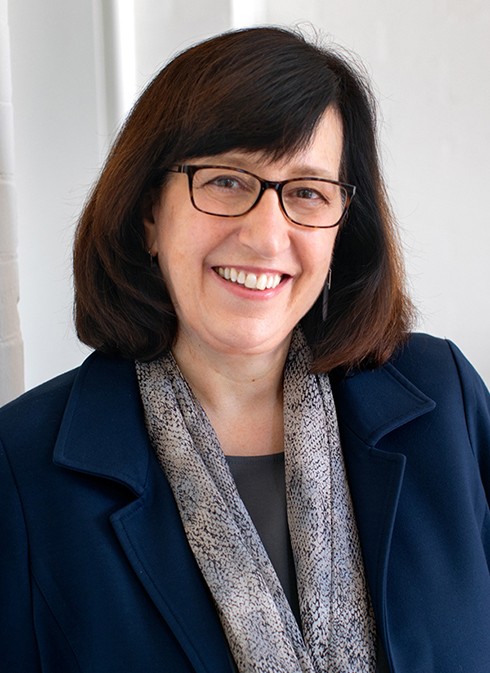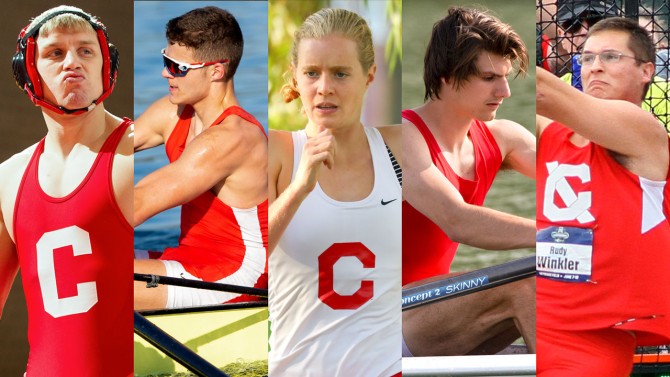
Stephen Jane, a postdoctoral fellow in the College of Agriculture and Life Sciences, deploys a sensor in an Adirondack lake. Research led by Jane and Peter McIntyre, Ph.D. ’06, associate professor in CALS, found that, given current trends, only about 5% of Adirondack lakes may continue to maintain water that is cold and oxygenated enough to support cold-water fish species.
Adirondack lakes’ warming is top Chronicle story of 2024
By Tom Fleischman, Cornell Chronicle
Like the canary in the coal mine, lakes in the Adirondack Mountains of northern New York are harbingers of peril.
Lake “browning” – when dissolved organic matter from forests turns water the color of tea – combined with a warming climate is making the bottoms of many lakes in the Adirondacks inhospitable in summer for cold-water fish such as trout, salmon and whitefish, according to a Jan. 2 Cornell Chronicle story that became our most viewed story of 2024. The research was from the lab of Peter McIntyre, Ph.D. ’06, associate professor in the College of Agriculture and Life Sciences.
Stories about groundbreaking research, such as exoplanets potentially harboring life and mushroom-controlled biohybrid robots, shared space on the Chronicle’s most-viewed list with stories about Cornell, including the retirement of President Martha E. Pollack.
Here is a rundown of the most popular of the roughly 800 stories posted since Jan. 1.

Lisa Kaltenegger, director of the Carl Sagan Institute, is pictured in the Space Sciences Building earlier this year. CREDIT: Ryan Young/Cornell University
Top research stories
The No. 2 research story of the year (No. 4 overall), “In search for alien life, purple may be the new green” reported on a study from the lab of Lisa Kaltenegger, director of the Carl Sagan Institute and associate professor of astronomy in the College of Arts and Sciences. The researchers found that an Earth-like planet orbiting another star might look very different from Earth, potentially covered by bacteria that receive little or no visible light or oxygen, and instead use invisible infrared radiation to power photosynthesis. Many such bacteria on Earth contain purple pigments, and worlds where these bacteria are dominant would produce a distinctive “light fingerprint,” detectable by high-powered telescopes.
The No. 3 research story (No. 5 overall) focused on work out of the Organic Robotics Lab, run by Rob Shepherd, professor of mechanical and aerospace engineering in Cornell Engineering. The Aug. 28 story, “Biohybrid robots controlled by electrical impulses — in mushrooms,” included a video of the device in action. Shepherd’s group found that by harnessing the electrical signals from the mycelia (the underground vegetative part of mushrooms), they could devise a new way of controlling “biohybrid” robots that can potentially react to their environment better than their purely synthetic counterparts.
The fourth most-viewed research story (No. 10 overall), No, China is not buying up all U.S. farmland , from May 29, reported on a finding from Wendong Zhang, assistant professor at the Dyson School of Applied Economics and Management. Using a federal dataset of foreign investments in U.S. agricultural land as of 2020, Zhang and collaborators found that countries classified by the federal government as “adversary,” such as China, held only 1% of the roughly 40 million acres of foreign-owned farmland. The top foreign country in terms of ownership of U.S. agricultural land? Canada.
Top stories about Cornell
This year’s No. 2 story, from Oct. 9, reported on the death of longtime university benefactor Ratan Tata ’59, B.Arch. ’62, one of India’s most influential and respected business leaders and philanthropists, and a former Cornell trustee who became the university’s largest international donor. In 2008, a $50 million gift from the Tata Trusts created the Tata-Cornell Institute for Agriculture and Nutrition, a long-term research initiative, and endowed the Tata Scholarship for Students from India. And in 2017, a $50 million investment from Tata Consultancy Services helped build the Tata Innovation Center on Cornell Tech’s Roosevelt Island campus in New York City. “Ratan Tata has left an extraordinary legacy in India, across the world and at Cornell, which he cared about deeply,” Interim President Michael I. Kotlikoff said.
The No. 3 story, the announcement on May 9 of Pollack’s retirement, detailed the myriad accomplishments of Cornell’s 14th president. Among them: creation of the Cornell Jeb E. Brooks School of Public Policy; naming the Cornell Ann S. Bowers College of Computing and Information Science and the Cornell Peter and Stephanie Nolan School of Hotel Administration; the launch of new programs in sustainability, digital agriculture, artificial intelligence, design and technology, and other areas; and expansion of external research expenditures by nearly 50%. Pollack retired June 30 and was given the title of president emerita by the Cornell Board of Trustees.
Also in the top 10:
Kavita Bala, dean of Cornell Bowers CIS, named provost (Sept. 25): Kavita Bala, dean of the Cornell Ann S. Bowers College of Computing and Information Science (Cornell Bowers CIS), will be the university’s 17th provost, Interim President Michael I. Kotlikoff announced. Bala’s five-year appointment begins Jan. 1.
Admitted Class of 2028 personifies Cornell’s founding principles (March 28): Among the 5,139 students admitted to the Class of 2028 were an EMT interested in studying health care, a captain of their high school fencing team and a painter who’s studying fine art.
Cornell to reinstate standardized test requirements for fall 2026 (April 22): The university will reinstitute standardized testing requirements for students seeking undergraduate admission for fall 2026 enrollment, based on evidence from a multiyear study conducted by Cornell’s Task Force on Standardized Testing in Admissions.
Q&A: Cornell releases demographic data for ‘exceptional’ incoming class (Sept. 25): Cornell released additional data related to the incoming class of 2028, the first cohort of undergraduate students admitted since the U.S. Supreme Court ruling that prohibited race-conscious admissions practices.
Other highlights:
Cornellian wins Nobel: On Oct. 8, John Hopfield, Ph.D. ’58, won the 2024 Nobel Prize in physics. Hopfield, a professor emeritus at Princeton, shared the award with Geoffrey Hinton of the University of Toronto. The two were honored for their work in training artificial neural networks; as the Nobel organization said in its announcement, the pair “have used tools from physics to develop methods that are the foundation of today’s powerful machine learning.”
Sweet freedom of expression: The 2023-24 academic year had a theme – “Freedom of Expression: The Indispensable Condition” – and the Chronicle published many theme-related stories. The spring semester highlight was the annual ice cream-making contest in the Science and Technology of Foods (Food Science 1101) introductory class. Flavors were inspired by the university’s theme year. The winner? “Brewing CommuniTea,” a tea-flavored ice cream inspired by the conversations that flow every day, all around the world, over simple cups of tea.
Big Red in Paris: Rolling coverage of the five Cornellians who competed in the 2024 Summer Olympic Games drew plenty of page views. A reminder of those Cornellians, and their results: Kyle Dake ’13, freestyle wrestling (bronze); Michael Grady ’19, men’s four rowing (gold); Taylor Knibb ’20, women’s triathlon (19th place), women’s cycling time trial (19th) and women’s triathlon mixed relay (silver); Sorin Koszyk ’20 – men’s double sculls rowing (fourth); and Rudy Winkler ’17, men’s hammer throw, track and field (sixth).
Other sports headlines included the announcement that Mike Schafer ’86, an institution both at Cornell and in NCAA men’s hockey, will retire at the end of the current season. The Big Red head coach since 1995, Schafer played for four years in front of the Lynah Faithful before embarking on a long, successful coaching career. And the Cornell men’s basketball team, with its hurry-up-and-score style of play, qualified for the Ivy League Tournament after posting a 22-6 overall record, its third consecutive winning season, and finishing third in the Ivies with an 11-3 mark. The season didn’t end the way the Red had hoped: It lost to Yale in the Ivy tournament semifinals, 69-57, then fell in a heartbreaker at Ohio State, 88-83, in the first round of the NIT.
Other notable passings:
Ann S. Bowers ’59, a pioneering tech executive and longtime philanthropist whose transformational gift established the Cornell Ann S. Bowers College of Computing and Information Science, died Jan. 24 in Palo Alto, California, at 86. Bowers’ influential gifts exceeded $100 million over three decades, and included support for Gates Hall – the current home of Cornell Bowers CIS – as well as the new building under construction adjacent to Gates.
Joan Klein Jacobs ’54, a global philanthropist who believed strongly in the power of education and the arts to transform lives, died May 6 in San Diego at 91. Jacobs and her husband of 69 years, Irwin M. Jacobs ’54, BEE ’56, founding chairman and CEO emeritus of Qualcomm, have been lifelong philanthropists, championing education, health care, the arts and other causes.
Media Contact
Get Cornell news delivered right to your inbox.
Subscribe



